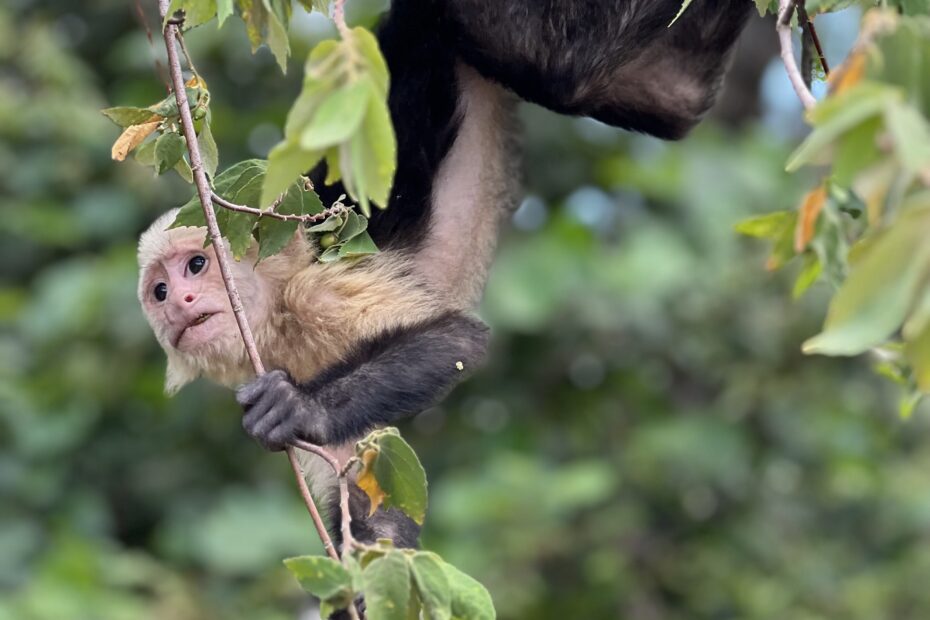A recent study conducted by the University of Michigan has revealed that wild capuchin monkeys in Costa Rica experience a decline in immune performance when exposed to higher temperatures. The research, led by U-M anthropology doctoral student Jordan Lucore, suggests that even modest increases in temperature, such as those reaching 86°F, can significantly affect the immune system of these primates. The study, published in Science Advances, indicates that younger monkeys are particularly vulnerable to heat, highlighting the potential impact of climate change on wildlife populations.
Lucore and his team set out to examine how temperature influences the immune system of white-faced capuchin monkeys (Cebus capucinus), which inhabit the Taboga forest reserve in Costa Rica. Known for their adaptability, capuchins are considered generalist species capable of thriving in a range of climates and environments. However, the results of this study were surprising, even to the researchers. “Capuchins are resilient creatures, so seeing these effects at such low temperatures was concerning,” Lucore said.
The study’s findings suggest that the immune system of these monkeys, particularly their generalized immune response (which is the first line of defense against pathogens), weakened when the animals were exposed to warmer temperatures for as little as two weeks. The generalized immune system is crucial for the initial detection and response to pathogens, and its compromised function can leave the animals more susceptible to infections. This immune decline is concerning because it could have significant implications for the monkeys’ overall health and survival.
A critical aspect of the research was the focus on neopterin, a biomarker produced when the immune system is activated. Unlike traditional methods that require blood samples, Lucore and his team used a non-invasive technique to collect urine samples from the monkeys. Urine samples can be analyzed for neopterin levels, allowing the researchers to assess immune performance without causing stress or harm to the animals. To avoid contamination, the researchers employed a “clean catch” method, using a basket attached to a stick to collect urine as the monkeys urinated naturally. Each monkey was individually identified to ensure that the urine samples were correctly attributed.
By analyzing the neopterin levels and correlating them with temperature data, the team discovered a clear relationship between warmer temperatures and a decline in immune function. More importantly, they found that younger monkeys, whose adaptive immune systems have not fully developed, were particularly affected. “Young individuals rely heavily on their generalized immune systems, which makes them more vulnerable to environmental stressors like heat,” Lucore explained. This finding is particularly concerning because it suggests that younger monkeys, who are still developing their adaptive immune systems, may be at greater risk during periods of heat stress.
The research raises important questions about the long-term implications of climate change on wildlife populations. While the study only tracked short-term immune system changes, Lucore noted that further research would be needed to determine whether this immune system decline translates into long-term health consequences, such as reduced survival or reproductive success. Additionally, while the findings are specific to capuchin monkeys, they provide valuable insights into how climate change could affect other wildlife species, particularly those living in environments that are already vulnerable to temperature fluctuations.
Lucore emphasized the broader relevance of the study, noting that climate change is a global issue that will affect all living organisms in unpredictable ways. “The fact that relatively short-term data collected by a graduate student could show such strong evidence of temperature affecting wildlife physiology underscores the importance of monitoring how climate change impacts the fundamental systems we depend on,” Lucore said.
The study’s implications are particularly relevant as scientists continue to explore the effects of climate change on ecosystems and wildlife. The research also highlights the value of non-invasive fieldwork in studying wildlife physiology, demonstrating how new methods can provide critical data without disturbing natural behaviors.
Lucore was joined in the research by an international team, including co-directors Jacinta Beehner, Thore Bergman, and Marcela Benítez, who lead the Capuchinos de Taboga Research Project, launched in 2017. This long-term project examines various aspects of capuchin behavior, cognition, and endocrinology. The field team, including co-authors Amy White, Lorena Sinclair, Vasco Alexandre Martins, Sarah Kovalaskas, and Juan Carlos Ordoñez, played a vital role in data collection, while co-author Andrew Marshall, a professor at U-M, contributed critical analysis and interpretation.
As the world grapples with the effects of climate change, this study provides valuable insights into how even slight temperature increases can have a significant impact on wildlife health. By focusing on capuchin monkeys, the research underscores the interconnectedness of climate, ecosystems, and the survival of species, offering a glimpse into the potential challenges many animals face as the planet warms.
Source: University of Michigan
